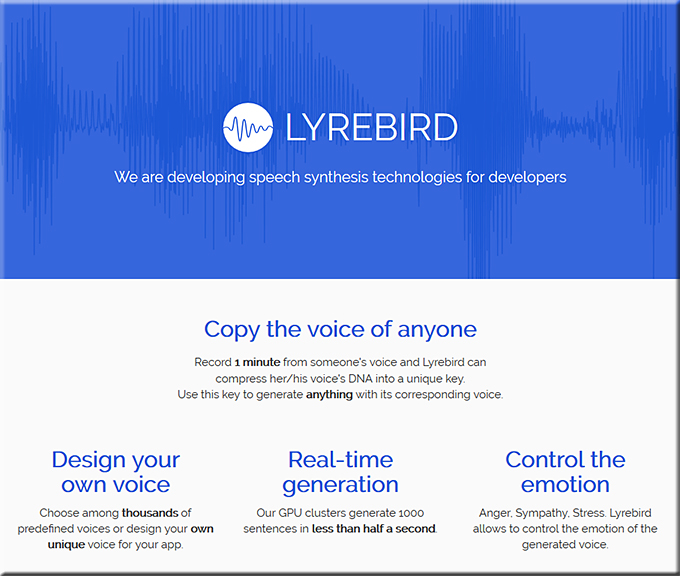From DSC:
This type of technology could be good, or it could be bad…or, like many technologies, it could be both — depends upon how it’s used. The resources below mention some positive applications, but also some troubling applications.
Lyrebird claims it can recreate any voice using just one minute of sample audio — from theverge.com by James Vincent
The results aren’t 100 percent convincing, but it’s a sign of things to come
Excerpt:
Artificial intelligence is making human speech as malleable and replicable as pixels. Today, a Canadian AI startup named Lyrebird unveiled its first product: a set of algorithms the company claims can clone anyone’s voice by listening to just a single minute of sample audio.
Also see:
Imitating people’s speech patterns precisely could bring trouble — from economist.com by
You took the words right out of my mouth
Excerpt:
UTTER 160 or so French or English phrases into a phone app developed by CandyVoice, a new Parisian company, and the app’s software will reassemble tiny slices of those sounds to enunciate, in a plausible simulacrum of your own dulcet tones, whatever typed words it is subsequently fed. In effect, the app has cloned your voice. The result still sounds a little synthetic but CandyVoice’s boss, Jean-Luc Crébouw, reckons advances in the firm’s algorithms will render it increasingly natural. Similar software for English and four widely spoken Indian languages, developed under the name of Festvox, by Carnegie Mellon University’s Language Technologies Institute, is also available. And Baidu, a Chinese internet giant, says it has software that needs only 50 sentences to simulate a person’s voice.
Until recently, voice cloning—or voice banking, as it was then known—was a bespoke industry which served those at risk of losing the power of speech to cancer or surgery.
…
More troubling, any voice—including that of a stranger—can be cloned if decent recordings are available on YouTube or elsewhere. Researchers at the University of Alabama, Birmingham, led by Nitesh Saxena, were able to use Festvox to clone voices based on only five minutes of speech retrieved online. When tested against voice-biometrics software like that used by many banks to block unauthorised access to accounts, more than 80% of the fake voices tricked the computer.
Per Candyvoice.com:
Expert in digital voice processing, CandyVoice offers software to facilitate and improve vocal communication between people and communicating objects. With applications in:
Health
Customize your devices of augmentative and alternative vocal communication by integrating in them your users’ personal vocal model
Robots & Communicating objects
Improve communication with robots through voice conversion, customized TTS, and noise filtering
Video games
Enhance the gaming experience by integrating vocal conversion of character’s voice in real time, and the TTS customizing
Also related:
From DSC:
Given this type of technology, what’s to keep someone from cloning a voice, putting together whatever you wanted that person to say, and then making it appear that Alexa recorded that other person’s voice?











